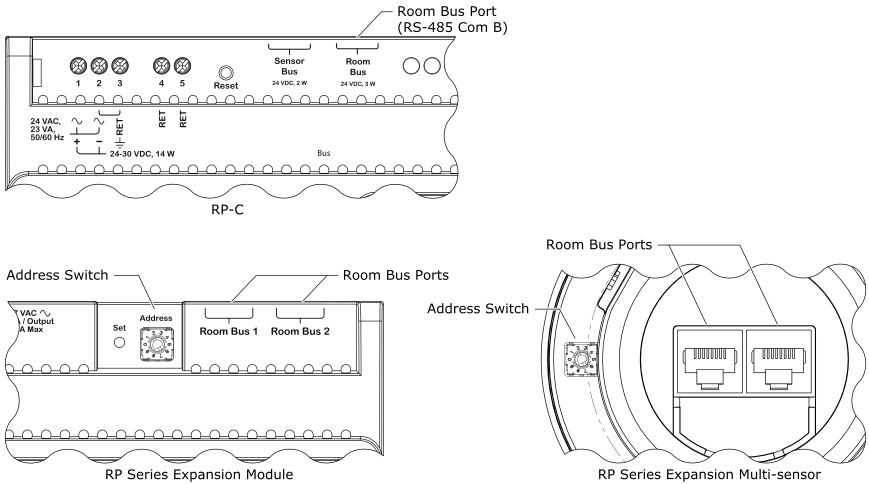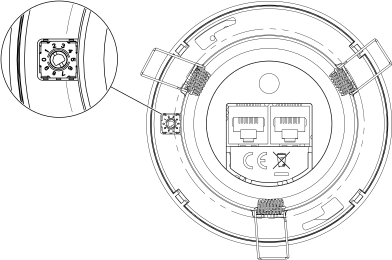The RP-C room bus allows RP controller expansion modules and multi-sensors to be connected to the controller for motion detection, luminosity measurements, communication with remote control (RP-C-RC-BLE), and control of electric lights and window blinds.
The maximum total length of the room bus is 72 m (236 ft). The room bus uses a Cat 5 (or higher) unshielded, straight-through wired cable with eight conductors (four twisted pairs) and RJ45 connectors. The wire size (cross-sectional area) should be 22 to 26 AWG (0.34 to 0.14 mm²). When the RP-C controller is installed in a space that handles conditioned air or return air, the room bus cables and IP network cables frequently must be plenum-rated to meet applicable building codes.
Per maggior informazioni, consulta Wiring
.
|
Avviso
|
|
LOSS OF COMMUNICATION
Ensure that the total length of the room bus does not exceed 72 m (236 ft).
Use a Cat 5 or higher unshielded twisted pair cable with eight conductors (four twisted pairs), a cross-sectional area of 22 to 26 AWG (0.34 to 0.14 mm
2
), and a rating that meets the requirements of the target environment.
Failure to follow these instructions can result in loss of communication.
|
By default, the RP-C controller's Room Bus port (RS-485 Com B) is configured and allocated for the room bus.
Per maggior informazioni, consulta RP-C Communication Ports
.
action_zoom_plus_stroke

Figura:
Location of the Room Bus ports and address switches on the RP-C controllers and RP controller expansion modules and multi-sensors
Avviso
The restrictions listed below only apply to Connected Room Solutions for Buildings. For information on what restrictions apply to Connected Room Solutions for Hotels, see the supplementary document Architecture Guidelines – Hotel Application.
You can connect a single RP controller expansion module or multi-sensor to the room bus, or you can connect up to six devices in a daisy-chain configuration.
Avviso
When connecting devices to the RP-C room bus through a daisy-chain configuration, it does not matter if the incoming and outgoing cables are connected to one or the other room bus port on the device.
The RP-C room bus supports up to six connected RP controller expansion modules with the following restrictions:
Maximum of two DALI light modules
Maximum of two SMI blind modules
Maximum of four multi-sensors
action_zoom_plus_stroke

Figura:
Example of supported combination of RP controller expansion modules and multi-sensors on the RP-C room bus
Each RP controller expansion module and multi-sensor has a rotary switch, which is used to give the device a unique address on the room bus. An RP controller expansion module or multi-sensor can be given any address in the range of 1 to 6. Configuring the address 0 means that the device enters maintenance mode and goes offline. Configuring an address in the range of 7 to 9 also means that the device goes offline.
Per maggior informazioni, consulta RP Controller Expansion Module Room Bus Addressing
. An incorrectly configured switch can cause two devices to have the same address on the room bus, which means that both devices will be offline.
|
Avviso
|
|
LOSS OF COMMUNICATION
Ensure that the rotary switch on the RP controller expansion module or multi-sensor is configured to give the device a unique room bus address in the range of 1 to 6.
Failure to follow these instructions can result in loss of communication.
|
Tabella: Room Bus Addresses
|
Address
|
Description
|
|
0
|
Maintenance mode. Device offline.
|
|
1 to 6
|
Valid addresses supported by the EcoStruxure Building Operation software.
|
|
7 to 9
|
Reserved for future use. Addresses not supported by the EcoStruxure Building Operation software. Device offline.
|
Avviso
Devices connected to the RP-C room bus through a daisy-chain configuration can be assigned addresses regardless of the order in which the devices appear in the daisy chain. For example, device number 1 can have the address 6, device number 2 can have the address 4, and so on.


 RP-C Room Bus
RP-C Room Bus
 RP Controller Expansion Module Room Bus Addressing
RP Controller Expansion Module Room Bus Addressing

